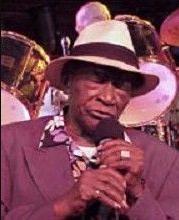Weepin' Willie Robinson Death
Weepin' Willie passed away on December 30, 2007 at the age of 81 in Jamaica Plain, MA. Weepin' Willie's cause of death was accident - smoking in bed.
When did Weepin' Willie Robinson die?
December 30, 2007How did Weepin' Willie Robinson die? What was the cause of death?
Accident - smoking in bedHow old was Weepin' Willie Robinson when died?
81Where did Weepin' Willie Robinson die? What was the location of death?
Jamaica Plain, MA
Weepin' Willie Robinson Birthday and Date of Death
Weepin' Willie Robinson was born on July 6, 1926 and died on December 30, 2007. Weepin' Willie was 81 years old at the time of death.
Birthday: July 6, 1926
Date of Death: December 30, 2007
Age at Death: 81
Weepin' Willie Robinson - Biography
"Weepin`" Willie Robinson, a blues singer who performed with Steven Tyler and Bonnie Raitt but also spent time homeless, has died at age 81. Robinson had been a sharecropper, an Army veteran and a friend of performers, including B.B. King."He was truly the elder statesman of the (Boston) blues. He was our godfather. He was the most dear man," Holly Harris, host of "Blues on Sunday" on WBOS radio, told The Boston Globe for Monday`s editions.When he sang, "you knew he meant it because he had passion," Harris said.Robinson died in a fire started by a cigarette he was smoking in bed, the Boston Fire Department said.William Lorenzo Robinson, better known as "Weepin` Willie," was born in Atlanta, Georgia, July 6, 1926. His early years were mostly spent outdoors in the fields of Winter Garden and Belglade, Florida, under a humid and unyielding sun picking tomatoes, potatoes, beans, and assorted crops. After his mother died when he was 10, Willie and his father migrated with the harvest seasons in a canvas-covered truck, driving from Florida through the Carolinas to v*rginia. Throughout this time while he traveled on the muddied back roads and labored in the fields, Willie knew there had to be some other way to make a living. "I didn`t like this. It was too hard," he said. On one trip to Cheapside, Va., Willie`s father had arranged to have him and a family friend head further north to Trenton, N.J. "My father said he`d join up with me in a few weeks. But I haven`t seen him since," he said. "I was just a kid, 15." He went to work on a Trenton farm milking cows, driving tractor and truck, performing the usual chores of the day. "I got sick of picking potatoes and the rest, so they let me drive the truck. It was better than picking," he said. After a year or so, he moved into the city and became a dishwasher. When he was 17 though, he enlisted in the Army. Willie recounts, "I told them I was 18, but I was really 17 ... In the Army they told me to listen up and pay attention, because if you don`t pay attention you`ll have to take basic training all over again and not get a chance to go overseas. So, I didn`t pay attention and I didn`t go overseas. I wasn`t mad at nobody." After three years in the service, Willie met a friend who booked bands in Trenton, and he started working as master of ceremonies in a nightclub. The club booked such luminaries as B.B. King, Bobby "Blue" Bland, Jackie Wilson, and Little Richard. While King, Bland, Wilson, and Richard carried their own MC, Willie was the house MC who`d tell jokes, dance, sing, and generally warm up the people before the main performers came out. "I got to know a lot of people personally this way, B.B., Bobby Bland, Big Joe Turner, they all came through." When Willie first started MC-ing in Trenton, the owner said that he needed to change his name. They first tried Willie the Weeper, but that didn`t really fit. So Willie shortened it to Weepin` Willie, and has been ever since. B.B. King was most responsible for the development of Willie as an entertainer. B.B. told him that if he wanted to sing, "then just sing. The rest will take care of itself." "But I don`t know any songs except your songs," Willie told B.B. one night. "Then sing `em," B.B. said. "So I got up there with his 21-piece band behind me ... Now I`ve never been around anything more than four pieces in my life, and I didn`t know nothing from a hole in the ground. But I was lucky. B.B. said, `That`s all right. Keep on singing. Learn one song. Then learn two, and so on. Learn enough songs to where five people will like you. Maybe after a while 30 people will like you. Just keep on going. That`s how I started out.` " B.B. also advised him to always sing so that women will like you. "Because if you sing to the women, the men will always follow," he said. "Do what you can do the best you can do, and after that you ain`t got no control over it." "Well I must have done all right because no one ever asked for their money back whenever I sang. I never had any formal lessons or anything like that. I just sing what I feel," Willie said. "I never say that I worked for B.B. King or Jackie Wilson or anyone else. I tell people that I worked on stage with them. And I worked with a lot of people -- Jimmy Reed, Chuck Jackson, Otis Redding, Joe Tex, and Solomon Burke. Solomon is one of them stars who never really shined, but he was there all along the way," he said. In 1959, a young woman from Louie`s Lounge in Roxbury came to Trenton and asked Willie, "I like your band, do you want to go to Boston?" "Yeah, we`ll go to Boston," he told her. "And we`ve been here ever since." Willie worked at Louie`s Lounge as the house MC for several years and fronted the house band. "That`s where it was happening -- Roxbury -- in those days. It was hot. All the players came through there." He then worked at Basin Street South as assistant manager for a few years, and then moved over to the Peppermint Lounge. Around the corner from the Peppermint was the Golden Nugget and the Palace, nightspots that jumped every night of the week. This was about 1962-3. In 1964, Tommy Hunt, author of the then mega-hit song "Human," hired Willie as his MC and entertainer at the Ebb Tide. "When I come on, I want the stage hot," Hunt told Willie. "If it`s not hot, then you`re fired." So it was up to Willie and a man called Herky, who was known as the Monkey Man because of his ape schtick, to whip up the crowd for Hunt. "We stayed on the stage and had to keep moving all the time. If he looked over and saw we weren`t moving, he`d fine us $10. Sometimes he`d play for two hours straight and we`d have to be up there moving with him the whole time. I used to say, `Oh, my God this guy is going to kill me.` But he paid good money. The money I make now is what I was making then." When Hunt was on, he was a good entertainer. But he had a reputation as a fickle performer, one who often feigned himself sick if he didn`t want to work on a particular night. Willie said he did have a slight heart attack one time, but after he recovered it became a favorite excuse to duck gigs which he didn`t like. "I figured I`m not going anywhere with this guy," Willie said. "But he paid good, I`ll say that about him." Hunt eventually moved his entire band to England, where he still resides, and raised a family and did pretty well for himself. Still a migrant in the musical world, Willie then worked at Club New Orleans in Boston`s Combat Zone on LaGrange Street. Then he moved to play at Jacob Wirth on Stuart. That`s when guitarist Buddy Johnson joined Willie`s band, forming an association as The Buddy Johnson/Weepin` Willie or the Weepin` Willie/Buddy Johnson All Star band. By this time, his experience as a showman was evident to every nightclub owner, and it seemed everyone in Boston knew Weepin` Willie as a class act. Other jobs included the International Lounge, Ben`s Lounge, and performances at just about every watering hole in and around the city. (Buddy Johnson died in May 1998.) Willie`s charismatic personality takes over when he`s on stage, a commanding presence that brings immediacy to his audience. "They like that one-on-one contact. They can feel it, and that`s what he brings to every show," according to Peter Lembo, Willie`s former manager. "I call him the Dean Martin of the blues. Martin wasn`t the greatest singer in the world but he had that personality that could bring a song across." "I never called myself a singer," Willie said. "To me, I`m just entertaining. Whatever I do, people seem to like it. I can`t sing like nobody else, I just sing like me." Willie says that in addition to singing, he was quite the dancer in his day. "I don`t look like it, but I can dance too. Back then I could run through the house singing and dancing. But now, forget it." In looking back over his career as an entertainer, Willie said he`d like to be remembered as someone who "did what I liked to do and somewhere along the line I hope someone liked what I`d done. If you like what you`re doing, just hang in there. I never worried about no big money. I never did it for the money, I just did it cause I liked it." Art Simas, 1998His daughter, Lorraine Robinson, told the Globe her father found his place on stage."A great smile would come on his face and he would be in his own little world, like he`d tune everything out," she said. "He just, like, felt the music. It was so much in his soul."Robinson settled in Boston in 1959 and played in clubs, but by 2005 he was living on the street and out of touch with his family. Blues performers learned of his situation, held a benefit concert and made sure he was fed and clothed.Robinson later performed everywhere from local clubs to the hallways of the rest home where he lived.His wife, Alice, died four decades ago.








